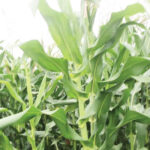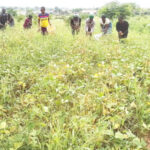The Nigeria Incentive-Based Risk Sharing System for Agricultural Lending (NIRSAL Plc) has developed a Hybrid Multi-Peril Crop Indemnity-Index Insurance (HM-II) for farmers across the country.
The insurance product, which was developed in collaboration with Royal Exchange General Insurance Company (REGIC), is designed to protect farmers from losses during a planting season caused by bad weather such as low or high rainfall, early or late season dry spells.
Sokoto onion farmers appeal for more investment
Abducted lecturer, 3 farmers regain freedom in Taraba
It also covers lightning, hailstorms and thunderstorms, pest outbreak, disease outbreak, fire outbreak and permanent disability or death of the farmer.

Based on its design, the key advantage of the HM-II is that in cases where such risks happen, benefits paid out to the farmer would be up to the maximum loan or the insured amount after confirmation by advanced satellite technology, an assessment by an agriculture expert or both.
Insurance policy for smallholder farmers has been the subject of many discussions, especially after the 2012 flood and the recent deadly flood that destroyed over 450,000 hectares of farms across many states in the north.
Although farmers and other stakeholders in the agricultural sector believe that the initiative would go a long way in addressing many disasters faced by the farmers, they said the initiative would only succeed if the real farmers in the rural communities are involved in the process.
Architect Kabiru Ibrahim, President of the All Farmers Association of Nigeria (AFAN), stressed that any insurance taken to de-risk an investment would be relevant and appreciated, adding that the “farmers welcome this improvisation from NIRSAL.”
“We hope this form of insurance will be extended to all farmers and not only those processing or accessing loans as obtained in the Anchor Borrower Program.
“A full-scale insurance policy for agriculture is best arranged between the farmers and NAIC as AFAN is discussing with NAIC for all farmers.
“Whatever modalities NIRSAL deploys in executing the insurance policy should be fully discussed with the farmers before implementation,” he stated.
The AFAN president, however, opined that the best option is to encourage the farmers to imbibe the culture of taking insurance with the Nigerian Agricultural Insurance Corporation (NAIC).
Chief Alphonsus Inyang, a farmer and development expert, welcomed the development by the NIRSAL and the insurance company but put forward key areas that the collaboration must put into consideration.
He said farmers have to be properly trained on the dynamics of the policy to avoid assumptions as is mostly the case, especially among rural farmers.
In addition, Chief Inyang opines that a rugged indemnity framework should be worked out to avoid the underwriters taking the farmers for granted when claims arise.
“Cropping calendars based on zones should be determined to serve as a guide to all stakeholders.
“This is important because agriculture policies and programs in Nigeria are based on the cropping calendar of the northeast and northwest, which has left most parts of the south behind.
“For example, wet season planting in the south starts in February/March whereas in the north it’s dry season planting,” he stated.
HammaKwajaffa, a stakeholder in the cotton sector, viewed the development as being in the right direction because in the past, when some farmers encounter such huge losses,they never recover.
He believes that the NIRSAL’s move to cover the farmers through such insurance would greatly encourage the farmers to remain in business.
To Mr Toyin Ijaya, an agric economist, such insurance initiative is necessary because of the prevalence of climate change-related disasters in the country now, which he said have not been favourable to the farmers.
“But there should be close monitoring of the brokers involved in the process so that they will not short- change the farmers, whose investments, they are to protect in the long run,’’ he said.
He said without proper monitoring system, the real farmers in the rural communities might not benefit from the insurance package.
“I am saying it because most of our local farmers are not that educated and presently, the extension service officers who are supposed to educate them are not there.
“So, for them to be carried along, they must be properly educated on the operations of the package, if not, it will just be a waste as usual,” he advised.
Others also believe that climate change-related disasters are becoming prevalence and challenging to food production, adding that insurance space must be strengthened to respond to critical situations such as the recent flood disaster in the north and the apparent draught in the southwest.
Daily Trust reports that the new initiative was piloted during NIRSAL’s participation in the Central Bank of Nigeria’s (CBN) 2019 Anchor Borrowers’ Programme (ABP) Wet season farming.
NIRSAL’s Managing Director, Aliyu Abdulhameed, said the new product was another step towards the development of the NIRSAL Comprehensive Index Insurance (NCII) conceptualised in 2018 with the ultimate goal of Agric insurance product development by factoring in commodity pricing parameter in the cover to be issued.
“This latest development is a testament to the progress NIRSAL Plc is making in the Agricultural insurance space, prior to NIRSAL Plc’s intervention, private underwriters were not insuring agriculture.
“However, leveraging on NIRSAL Plc’s Insurance Pillar and in collaboration with the Nigerian Agricultural Insurance Corporation (NAIC) and the National Insurance Commission (NAICOM), we have brought about the inclusion of underwriters other than NAIC in underwriting Agricultural transactions and stimulated the development of new and innovative agricultural insurance products.”
Abdulhameed reiterated NIRSAL Plc’s commitment to not only protecting farmers but to also help Nigeria diversify its economy, attain self-sufficiency in food production and entrench inclusive economic growth in alignment with the Federal Government’s Economic Recovery and Growth Plan (ERGP).

 Join Daily Trust WhatsApp Community For Quick Access To News and Happenings Around You.
Join Daily Trust WhatsApp Community For Quick Access To News and Happenings Around You.


